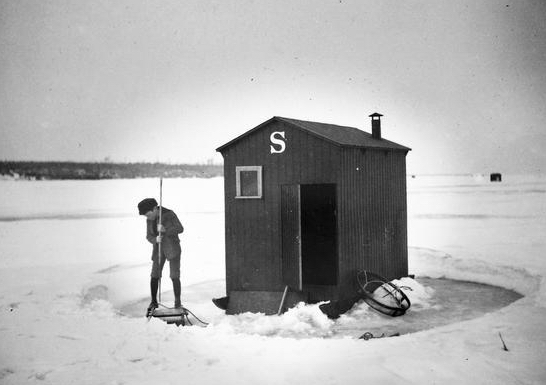When I was five or six years old, my mom’s boyfriend took us ice fishing. He drove his Jeep to the edge of one of Minnesota’s ten thousand lakes and then he kept going, down the boat ramp and out onto the glittering expanse of white. He stopped next to a small ice shanty, and then he built a fire. Right on the ice.
That’s what I remember, at least. But, now, thirty-four years later, these memories seem suspect. Did we really drive on the lake? Did he really build a fire on the ice?
I’ve been thinking about the past a lot lately. My therapist and I have begun the arduous process of unpacking my childhood to see if we can find the source of my adult neuroses. I worry this will be an impossible task. My memories of that time seem slippery. I can never quite get a solid enough grasp on them to wring out meaning. And even the ones that seem so vivid and real feel fake, like cheap knockoffs.
This is exceedingly common, of course. Children, even babies, are good at remembering until a certain age, and then childhood amnesia sets in. Our memories disappear or morph into half-truths. New memories appear out of thin air. Several years ago, author Elizabeth McCracken tweeted: “Have had reason to confront this upsetting fact: 87% of my kindergarten memories are in fact plagiarized from Ramona the Pest.”
My therapist says it doesn’t matter whether my memories are true. The facts don’t really matter, she assures me. We can build a narrative that will approximate the truth. It will be close enough.
The idea makes me a little squeamish. Facts do matter. Ask any journalist. I want the truth, not some just-so story invented decades later. So while my therapist prods me for the emotions behind these shadowy memories, I spend idle time fact-checking my childhood on the internet.
The boyfriend is shockingly easy to find. I don’t remember his last name, but I do remember that he worked at a furniture store. And that’s enough to get me his Facebook profile. There he is smiling behind a Harley Davidson. He likes hunting and golf and Red Lobster. He has the same mustache he did in 1983. He exists. Check.
Yes, people do drive on frozen lakes. They did it back then, and they do it still. Check. Yes, people build fires on the ice. Check.
I realize, of course, that this fixation with the minutiae of my childhood probably won’t inspire some deeper understanding of my psyche. What matters, of course, is the larger story. I like the way Melissa Dahl puts it.
In the realm of narrative psychology, a person’s life story is not a Wikipedia biography of the facts and events of a life, but rather the way a person integrates those facts and events internally—picks them apart and weaves them back together to make meaning. This narrative becomes a form of identity, in which the things someone chooses to include in the story, and the way she tells it, can both reflect and shape who she is. A life story doesn’t just say what happened, it says why it was important, what it means for who the person is, for who they’ll become, and for what happens next.
Still, I am ecstatic when my mom texts me to say that, yes, the boyfriend did have a Jeep. Check.
These details don’t matter. Still the checks bring me enormous comfort. Maybe that’s because I’m a journalist. Perhaps I’m trying to re-report my own life. Yes, the story is the important thing, but you can’t write the story until you have all the facts. Nail down the details and the chronology, and the story will come.
***
Image courtesy of Don…The UpNorth Memories Guy…Harrison via Flickr.

Your essay speaks to me on both the personal and scientific level. I deal with data all the time and like to think of them as “facts”, but the reality is so much more complicated. Incomplete data can be more misleading than complete fabrication. It has just a *taste* of truth. Enough to fool us into thinking we have the Answer. Or … The Truth.
I find the same holds true in my personal life which is occluded by my terribly poor powers of recollection. What if what I think is The Truth is just an incomplete picture? Someone could say something tomorrow that would change a basic tenet of a foundational memory and suddenly the whole castle of Fact that I had built on top of it wouldn’t seem so stable any more. What would happen if I could go back in time and actually *see* the events and learn The Truth. Could I even handle it?
Jack Nicholson would think not.